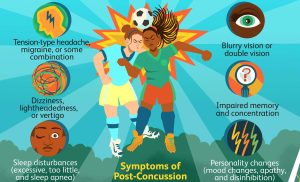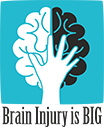empowering the severely brain injured and their families via support, understanding and a network of care
Effect of a Brain Injury
As far as modern science understands, the brain controls everything that we do and houses our memories and personality – though how this happens is not fully understood.
However, the brain’s importance means that when injured, the after-effects range from the minimal to the extreme, and from physical defects to drastic changes in personality. The initial effect of a brain injury falls into three main conditions; Minor, Moderate or Severe.
Minor brain injury – cerebral concussion
A minor brain injury is commonly referred to as concussion (or cerebral concussion).
This is the most common type of head injury, and the least dangerous. Around 80% of all head injuries are concussions, with the majority of them occurring in young people aged between 5 and 14.
Common symptoms include brief unconsciousness, mild confusion, headaches, nausea and dizziness.
It is important that you seek medical advice for any head injury, as all head injuries can lead to complications. Even if you are initially discharged, head injuries need to be monitored and if the following symptoms further medical advice should be sought:
- Falling unconscious
- Worsening disorientation
- Difficulty in walking
- Vomiting
- Problems with communication
- Weakness in the arms or legs
- Blurred vision
- Inability to be woken or unusual drowsiness
- Clear fluid coming from the ears or nose
- Severe headache that is not relieved by painkillers
Moderate brain injury
This is an injury that causes between 15 minutes and 6 hours of unconsciousness and/or if the person experiences amnesia up to 24 hours after the injury. If a person has a moderate brain injury they are typically kept in hospital overnight in order to properly assess the damage and ensure that there is no serious secondary injuries.
A person with a moderate head injury is likely to suffer some of, but not limited to, the following effects:
- Fatigue
- Headaches
- Dizziness
- Irritability
- Low attention span and an inability to concentrate
- Poor memory
One of the issues that arise from a moderate brain injury is that victims often expect their symptoms to go away within a few days. This is unlikely to be the case, as it is typical for symptoms following a moderate brain injury to last between 6 to 9 months. After several weeks, patients who expect to be healthy within a few days can become very anxious that the problems will be permanent. This anxiety can lead to further problems, creating a vicious cycle.
Severe brain injury
A head injury is classed as severe if the sufferer is rendered unconscious for over 6 hours. It is also classed as a severe injury if they suffer amnesia for more than 24 hours.
With a severe brain injury, the person will often need to be hospitalised and may suffer permanent and life changing disabilities. Whilst they may show many of the symptoms and effects of a Minor or Moderate brain injury their condition will be far more severe and the extent of the disabilities sustained largely depends on how long the person is unconscious. The longer this is, the more likely it is that the person will suffer a serious deficit. ‘Very serious injury’ is a further category for those who remain unconscious for 48 hours or more.
Please note this information is a generalisation. The complexity of severe brain injuries means that every case is unique, and only a medical professional who is familiar with the particular circumstances in question can give you in-depth advice.
The effect of a brain injury falls into three further, but main categories;
Cognitive
Physical
Behavioural/Emotional



